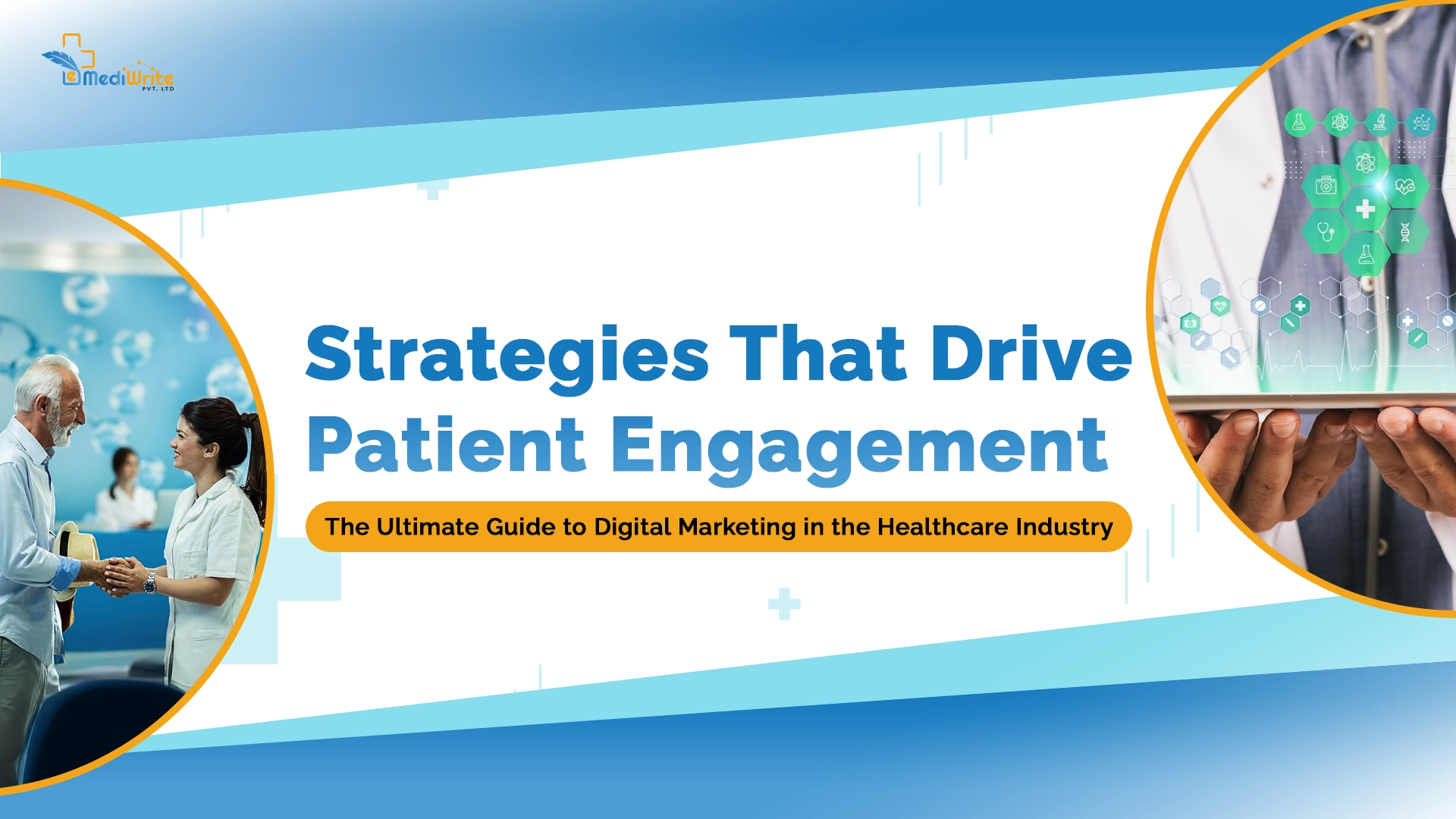Introduction to Digital Marketing in the Healthcare Industry
In today’s patient-centric era, digital marketing in the healthcare industry is no longer an option, it’s a necessity. Patients are online more than ever, actively researching symptoms, comparing hospitals, reading reviews, and engaging with medical content before choosing a provider.
Healthcare organizations that embrace digital transformation can connect with patients at every stage of their journey from awareness to appointment booking through data-driven, compliant, and personalized campaigns.
This guide explores the key components of healthcare digital marketing strategies, how to measure performance effectively, and the emerging technologies shaping the future of online medical marketing.
Also Read This: The Untold Power of Public Relations in the Medical World
Core Components of Healthcare Digital Marketing Strategies
Successful digital marketing in the healthcare industry requires an integrated approach that combines visibility, trust, and engagement. Here’s how healthcare brands can build a strong digital presence.
Website Experience and SEO for Healthcare
Your website is the digital front door of your healthcare brand. To attract and convert patients, it must be:
- Mobile-friendly and fast-loading.
- Optimized for search engines with relevant medical keywords, structured data, and local SEO tactics.
- Accessible and user-focused, providing easy navigation to book appointments or find specialists.
SEO plays a crucial role in digital marketing for hospitals by ensuring your services appear when patients search for care near them. Implementing schema markup, quality backlinks, and medically accurate content can significantly improve visibility.
Also Read This: Pharma Branding Strategies 2025
Content Marketing and Patient Engagement Marketing
High-quality content builds trust, educates patients, and drives engagement. Effective patient engagement marketing involves producing blogs, infographics, videos, and guides that simplify complex medical topics.
When executed properly, content marketing in the healthcare industry enhances reputation and encourages long-term relationships. Focus on:
- Patient education blogs on common conditions or treatments.
- Doctor interviews and Q&A sessions.
- Health tips tied to seasonal awareness campaigns.
Social Media and Online Medical Marketing
Social platforms have become powerful tools for online medical marketing. Hospitals and clinics can use them to share educational content, patient testimonials, and updates while humanizing their brand.
Top platforms include:
- Facebook and Instagram: For community awareness and storytelling.
- LinkedIn: For professional networking and showcasing medical expertise.
- YouTube: For explainer videos and healthcare tutorials.
When done ethically and consistently, social media marketing fosters community trust and strengthens digital marketing in the healthcare industry.
Paid Media: PPC, Display, and Paid Social for Hospitals
Paid advertising helps hospitals reach targeted audiences faster. Using digital marketing for hospitals, campaigns can include:
- Google Ads (PPC): For patients actively searching for care.
- Display Ads: To build brand awareness.
- Paid Social: For promoting services and events to local communities.
Tracking conversions and optimizing landing pages ensures better digital marketing ROI in healthcare.
Email, SMS, and Marketing Automation
Automated communication channels nurture patient relationships efficiently. Email newsletters, appointment reminders, and follow-up messages are essential components of healthcare digital marketing strategies.
Automation tools personalize communication, segment patients, and track engagement, ensuring timely follow-ups while maintaining HIPAA compliance.
Also Read This: 5 Strategies for Balancing Pharma Product Innovation
Measuring Success: Tracking Digital Marketing ROI in Healthcare
Effective digital marketing in the healthcare industry requires continuous measurement and optimization. Tracking performance ensures your marketing efforts deliver measurable outcomes.
Key Metrics and KPIs
To gauge digital marketing ROI in healthcare, monitor:
- Website Traffic & Conversion Rates (appointments, form submissions).
- Cost per Lead (CPL) and Return on Ad Spend (ROAS).
- Engagement metrics like click-through rates and dwell time.
- Patient retention and referral growth.
These metrics provide insights into which channels drive the most valuable patient interactions.
Analytics Tools and Reporting Best Practices
Tools such as Google Analytics, HubSpot, and SEMRush help track the effectiveness of online medical marketing efforts. Regular reporting and dashboards enable marketing teams to:
- Identify high-performing keywords and content.
- Evaluate campaign ROI and patient behavior trends.
- Refine strategies to improve outcomes.
Data transparency ensures healthcare organizations allocate resources where they generate the greatest impact.
Also Read This: 5 Secrets to Creating High-Impact Marketing Materials
Advanced Tactics and Emerging Trends
The future of digital marketing in the healthcare industry lies in innovation. Emerging technologies such as artificial intelligence, automation, and virtual care promotion are redefining patient engagement.
Telehealth Promotion and Virtual Care Marketing
Telehealth has become a core service for hospitals worldwide. To promote virtual consultations effectively:
- Highlight convenience and accessibility in campaigns.
- Optimize landing pages for “online doctor” or “telemedicine near me.”
- Use social and email marketing to educate patients on booking and privacy processes.
This approach aligns digital marketing for hospitals with modern healthcare delivery.
Personalization, AI, and Chatbots in Healthcare
AI-driven personalization helps create smarter patient engagement marketing campaigns. Chatbots assist with FAQs, appointment scheduling, and symptom triage 24/7.
Personalized marketing powered by machine learning ensures that each patient receives tailored information, increasing engagement and satisfaction across healthcare digital marketing strategies.
AI Search Optimization and Local SEO for Doctors
Voice and AI search are transforming online medical marketing. Optimizing for natural language queries like “best pediatrician near me” or “cardiologist accepting new patients” improves local visibility.
Combining AI SEO with Google Business Profile optimization ensures doctors and clinics reach patients precisely when they need care.
Also Read This: From Data to Manuscript: A Step-by-Step Guide for Pharma Manuscript Writing
How Can Partnering with eMediWrite Drive Impactful Healthcare Marketing?
eMediWrite empowers healthcare providers to streamline and strengthen their digital marketing in the healthcare industry. From SEO-friendly content creation to campaign performance tracking, eMediWrite delivers scalable solutions that enhance visibility, trust, and engagement.
By partnering with eMediWrite, hospitals and clinics can:
- Build compliant and high-performing online medical marketing campaigns.
- Improve website SEO and ranking through expert content strategy.
- Enhance digital marketing ROI in healthcare with measurable insights.
- Automate communication and improve patient experience using intelligent tools.
eMediWrite’s healthcare-focused expertise ensures that marketing efforts are accurate, ethical, and fully aligned with regulatory standards enabling organizations to stay competitive in the digital age.
Conclusion
Digital marketing in the healthcare industry has evolved from simple online presence to a sophisticated, data-driven ecosystem designed to enhance patient engagement and trust.
By implementing integrated healthcare digital marketing strategies, leveraging online medical marketing, and tracking digital marketing ROI in healthcare, hospitals and clinics can connect meaningfully with patients at every stage of their care journey.
With partners like eMediWrite, healthcare organizations can navigate this complex landscape efficiently and confidently turning digital marketing into a powerful driver of patient satisfaction, brand authority, and sustainable growth.
FAQs
What are the first steps to launch digital marketing for hospitals?
Start with a strong website foundation, local SEO, and clear patient-focused content. Then expand into social media, paid advertising, and email automation to strengthen digital marketing for hospitals.
How do healthcare digital marketing strategies differ from other industries?
Healthcare marketing must comply with HIPAA and ethical guidelines. It emphasizes trust, education, and accuracy, unlike typical consumer marketing.
Which metrics best measure patient engagement marketing success?
Key metrics include appointment bookings, content engagement rates, patient retention, and ROI. These reflect the impact of patient engagement marketing campaigns.
What are compliance considerations for online medical marketing?
Online medical marketing must follow HIPAA, FDA, and regional advertising laws. Always ensure patient consent, data protection, and accurate claims.
How can small clinics track digital marketing ROI in healthcare effectively?
Use free tools like Google Analytics and Search Console to monitor leads, traffic, and conversions. Regularly review KPIs to assess ROI.
What emerging trends should healthcare marketers watch in 2026?
AI-driven personalization, predictive analytics, and advanced telehealth promotion are among the top healthcare digital marketing strategies to watch.





